 |
|
| |
| Pakistan launches 'School on Wheels' project to improve education in rural areas |
| |
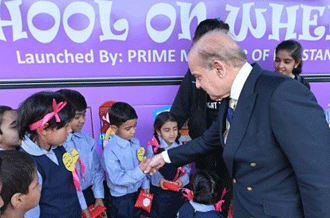 Pakistan government launched the 'School on Wheels' project to bring education to the doorstep of children whose parents are unable to send them to school. Prime Minister Shehbaz Sharif launched the initiative and expressed hopes that the initiative would increase the literacy rate in Pakistan, particularly in rural areas. 8 mobile classrooms will provide primary-level education and offer libraries and meals. Initially, the mobile school project consists of eight buses that will provide primary-level education to the children of Islamabad and nearby areas. Each bus is equipped with computers, desks, whiteboards, and LCDs. The government plans to increase the number of buses and expand the project to the rest of the country. Pakistan government launched the 'School on Wheels' project to bring education to the doorstep of children whose parents are unable to send them to school. Prime Minister Shehbaz Sharif launched the initiative and expressed hopes that the initiative would increase the literacy rate in Pakistan, particularly in rural areas. 8 mobile classrooms will provide primary-level education and offer libraries and meals. Initially, the mobile school project consists of eight buses that will provide primary-level education to the children of Islamabad and nearby areas. Each bus is equipped with computers, desks, whiteboards, and LCDs. The government plans to increase the number of buses and expand the project to the rest of the country.
|
| |
|
|
| UN humanitarian system meets less than half of hunger funding need |
| |
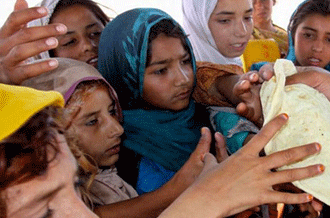 Only 47 per cent of hunger funding needs through the UN humanitarian system is met, leaving a hun-ger funding gap of 53 per cent, according to the Action Against Hunger 2023 Hunger Funding Gap Report. The report also found that countries experiencing the worst hunger crisis received less hunger funding (by the percentage of appeals filed) than countries with lower rates of hunger. The report, based on 2022 data recorded this month, was driven from the United Nations Office for Coordination of Humanitarian Affairs (UNO-CHA) financial tracking service. This yielded a list of 13 countries, which are the focus of the report, including Pakistan. Only 47 per cent of hunger funding needs through the UN humanitarian system is met, leaving a hun-ger funding gap of 53 per cent, according to the Action Against Hunger 2023 Hunger Funding Gap Report. The report also found that countries experiencing the worst hunger crisis received less hunger funding (by the percentage of appeals filed) than countries with lower rates of hunger. The report, based on 2022 data recorded this month, was driven from the United Nations Office for Coordination of Humanitarian Affairs (UNO-CHA) financial tracking service. This yielded a list of 13 countries, which are the focus of the report, including Pakistan.
|
|
| SPARC Youth Elections |
| |
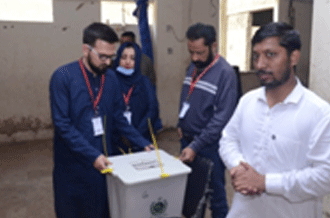 SPARC organized Youth Elections in Machar Colony, District Keamari Karachi. The elections were contested between 5 panels comprising 25 young people. All panels were formed keeping ethnic and gender diversity in consideration. The winning panel served as volunteer governing body of SPARC's Youth Clubs and manage various cultural, sport, art, and community reform actives under guidance of SPARC. SPARC organized Youth Elections in Machar Colony, District Keamari Karachi. The elections were contested between 5 panels comprising 25 young people. All panels were formed keeping ethnic and gender diversity in consideration. The winning panel served as volunteer governing body of SPARC's Youth Clubs and manage various cultural, sport, art, and community reform actives under guidance of SPARC.
|
|
| |
| Sessions on Importance of Electoral Process |
| |
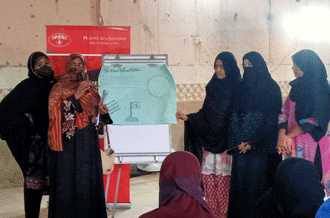 SPARC organized sessions on Importance of Electoral Process Youth Elections in Machar Colony, District Keamari Karachi. The first session was led by District Election Commissioner Kemari Ms. Syeda Humaira. She talked about the importance of free and fair elections and power of vote. The second session was organized by young women in order to motivate them to participate in election. This session was led by Ms. Sadia Shakeel, Development Sector Trainer. SPARC organized sessions on Importance of Electoral Process Youth Elections in Machar Colony, District Keamari Karachi. The first session was led by District Election Commissioner Kemari Ms. Syeda Humaira. She talked about the importance of free and fair elections and power of vote. The second session was organized by young women in order to motivate them to participate in election. This session was led by Ms. Sadia Shakeel, Development Sector Trainer. |
|
| |
| |
| From Local to Global – Partners Youth Network Workshop |
| |
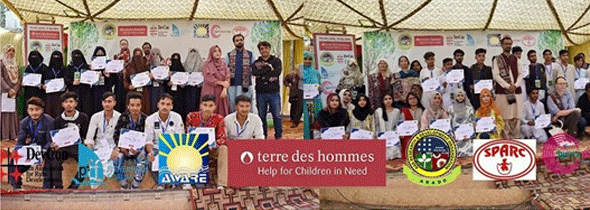
SPARC along with Terre des hommes organized a youth workshop on climate change and sustainable practices. The workshop led by environmental expert and activist Ms. Aafia Salam who provided participants with valuable information and hands-on activities related to climate change
|
| Gender Based Violence session in slum areas |
| |
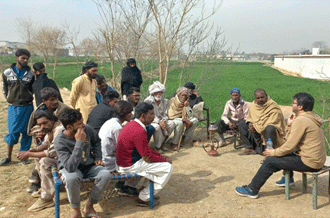 Gender Based Violence is prevalent in Islamabad slum settlements. Sparc besides empowering women through education and skill enhancement, keeps on engaging males members of the community as well. Over 300 people have been engaged in GBV sessions during the last one year. The engagement has created a positive debate among the community and people now participate and acknowledge the importance of this issue. Parents are now sensitized enough to understand the adverse impacts of child marriages and they have started challenging the norms as well. Gender Based Violence is prevalent in Islamabad slum settlements. Sparc besides empowering women through education and skill enhancement, keeps on engaging males members of the community as well. Over 300 people have been engaged in GBV sessions during the last one year. The engagement has created a positive debate among the community and people now participate and acknowledge the importance of this issue. Parents are now sensitized enough to understand the adverse impacts of child marriages and they have started challenging the norms as well.
|
|
|
|
| |
| Number of children without critical social protection increasing globally |
| |
 The number of children without access to social protection is increasing year-on-year, leaving them at risk of poverty, hunger and discrimination, according to a new report released by the International Labour Organization (ILO) and UNICEF. The urgent need to build universal social protection for children warns that an additional 50 million children aged 0-15 missed out on a critical social protection provision – specifically, child benefits (paid in cash or tax credits) – between 2016 and 2020, driving up the total to 1.46 billion children under 15 globally. According to the report, child and family benefit coverage rates fell or stagnated in every region in the world between 2016 and 2020, leaving no country on track to achieve the Sustainable Development Goal of achieving substantial social protection coverage by 2030. Failure to provide children with adequate social protection leaves them vulnerable to poverty, disease, missed education, and poor nutrition, and increases their risk of child marriage and child labour. The number of children without access to social protection is increasing year-on-year, leaving them at risk of poverty, hunger and discrimination, according to a new report released by the International Labour Organization (ILO) and UNICEF. The urgent need to build universal social protection for children warns that an additional 50 million children aged 0-15 missed out on a critical social protection provision – specifically, child benefits (paid in cash or tax credits) – between 2016 and 2020, driving up the total to 1.46 billion children under 15 globally. According to the report, child and family benefit coverage rates fell or stagnated in every region in the world between 2016 and 2020, leaving no country on track to achieve the Sustainable Development Goal of achieving substantial social protection coverage by 2030. Failure to provide children with adequate social protection leaves them vulnerable to poverty, disease, missed education, and poor nutrition, and increases their risk of child marriage and child labour.
A billion children also live in multidimensional poverty – meaning without access to education, health, housing, nutrition, sanitation, or water. Children living in multidimensional poverty increased by 15 per cent during the COVID-19 pandemic, reversing previous progress in reducing child poverty and highlighting the urgent need for social protection.
Moreover, the pandemic highlighted that social protection is a critical response in times of crisis. Nearly every government in the world is either rapidly adapted existing schemes or introduced new social protection programmes to support children and families, but most fell short of making permanent reforms to protect against future shocks, according to the report. |
| |
| About half of children under 5 in Somalia facing malnutrition although fears of famine on hold: NEW DATA |
| |
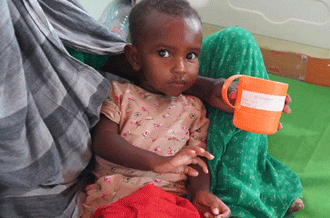 About 1.8 million children aged under five are still expected to suffer from acute malnutrition in Somalia this year with the emergency far from over even though the risk of famine has been averted for the time being. About 1.8 million children aged under five are still expected to suffer from acute malnutrition in Somalia this year with the emergency far from over even though the risk of famine has been averted for the time being.
The United Nations last year warned of a looming famine in Somalia which is facing its worst drought in about four decades after five failed rainy seasons combined with rising food prices and ongoing conflict, fuelling concerns of a repeat of 2011 when about 260,000 people died.
But new data said the delivery of humanitarian aid and some rain had averted famine in most parts of the country until June this year at least.
However an anticipated sixth consecutive below average rainfall season from April to June is expected to continue to suppress household food and income, with at least 6.5 million people –nearly 40% of the population – in need of humanitarian assistance.
Save the Children said the total number of children facing malnutrition has not changed since last December although the number projected to be severely malnourished had slightly reduced to about 480,000 from 513,500 with children losing their lives.
Somalia has reached a tipping point. The situation remains extremely serious, as the country is expecting a sixth season of below-average rainfall from March to June and exceptionally high food prices.
"While humanitarian efforts have so far averted a possible famine, the number of hungry and malnourished children across the country remains alarmingly high. A global response is still needed to address immediate humanitarian needs and implement lasting solutions to hunger.
|
|
|
|
|
|
|
|
| |
| |
| |
Our mailing address is: |
Follow SPARC on social media |
| |
House # 98, Street # 05, MPCHS, E-11/1, Islamabad
info@sparcpk.org | Tel # 051-2163011 |
|
|
|
|
|
| |
|